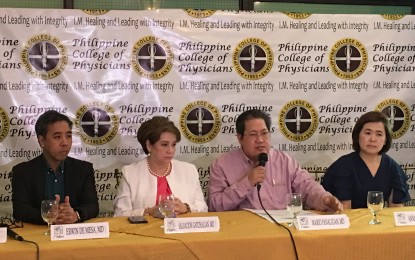
Philippine Society for Microbiology and Infectious Diseases president Dr. Mario Panaligan says there is no new measles virus strain in the country. (Photo by: Ma. Teresa Montemayor)
MANILA -- Medical experts on Wednesday stressed the importance of vaccination in combatting the spread of measles virus in some regions of the country.
Dr. Mario Panaligan, president of the Philippine Society for Microbiology and Infectious Diseases, said children and adults can easily contract the disease if they are not immune to it.
"This is the latest numbers covering January 1 to February and there's a total of 4,321 measles-rubella reports and out of which, there are 4,302 cases. The lab-confirmed measles is 177 while the measles compatible, meaning those upon diagnosis, is 2,135 and those pending evaluation is 1,939," he said.
Panaligan noted that measles victims are aged one year to 76 years but children aged one year to four years are the most affected by the outbreak with 1,460 cases or 34 percent of total cases.
He added that 1,146 cases or 27 percent of total cases belong to the less than nine months age group and are mostly male.
"Out of the total measles cases, 2,589 were not vaccinated, 105 had one dose, 26 had two or more doses, 685 cases with unknown number of doses, and 627 cases with unknown vaccination status, and very crucial is the unknown status. And, we just received data that there are already 64 deaths in San Lazaro Hospital," he said.
Panaligan said there is no new strain of measles in the country and the measles outbreak could be attributed to the low vaccination turnout.
"Ang measles virus ay talagang nakakahawa. Halimbawa, ako na may measles, hawakan ang mikroponong ito, tapos hawakan ito ng ibang tao, magkakaroon din sila ng measles (The measles virus is truly contagious. For example, I have measles and I hold this microphone and other people will hold this, they'll also contract measles). So if you're not immune, you were not vaccinated, you'll have a 90-percent chance of contracting the disease," he added.
Philippine Pediatric Society president Salvacion Gathchalian, one of the forum panelists, said babies who are one to six months old could be protected from measles if their mothers have been vaccinated against the disease when they were young or at least four weeks before their pregnancy.
"We educate the mothers about the vaccines their children should get and when they should get it. It's the same with health centers. Vaccines are always available. I understand there could be communities which are far from health centers so I advise those parents to take advantage of the opportunity to have their children vaccinated while DOH (Department of Health) is doing door-to-door vaccination," she added.
Meanwhile, Anna Lisa Ong-Lim, Pediatric Infectious Disease Society of the Philippines president, urged the public to be responsible with regard to their children's health and to cooperate with the government in addressing the measles outbreak.
"It is a matter of making sure that they access the resources. The vaccines and health centers have always been there," she said.
Ong-Lim added that DOH is trying its best to solve the outbreak and push their vaccination program.
"In a health system, we must understand there's a pool of susceptibles and these are the ones in far-flung areas, areas with war conflicts, religions keeping them from getting vaccinated. They are the sources of outbreaks and the best solution to this is to reduce the number of people who can cause them," she said.
Gatchalian, on the other hand, stressed that "vaccination is done continuously in health centers."
"I don't think there was a lack of effort in the government. To augment the plans of DOH, medical societies, lahat po kami ay nagtutulong-tulong para ma-administer ang bakuna sa (we are all working together to administer the vaccines to the) number of children who need to be vaccinated to be able to control the outbreak," she said.
On Monday, Health Secretary Francisco Duque III led a National Disaster Risk Reduction and Management Council meeting to address the measles outbreak in the different regions nationwide.
During the meeting, the leaders and representatives of various government agencies presented their plans to help prevent further transmission of the virus. (PNA)
